Dementia Articles
What's the difference between Alzheimer's disease and dementia?

January 8, 2020 | Understanding Dementia
Dementia is a scary word that people don’t always understand. It is well known that dementia includes memory loss, but it can also include things like loss of reasoning or judgement, difficulty using language, and challenges in communicating effectively. Dementia is different from normal changes that come with the aging process. It doesn’t happen to everyone and it doesn’t happen only to older people.
The word dementia describes a set of symptoms: changes in memory, language, communication, focus, and reasoning. There are many types of diseases or conditions in the brain that cause these symptoms, and Alzheimer’s disease is one of those diseases. Alzheimer’s disease and dementia are different because Alzheimer’s disease causes changes in the brain, and we call those changes “dementia.” Typical symptoms include difficulty with recent memory, changes in speech and communication, disorientation, and poor judgement.
There are many other conditions that can cause dementia, which is just one more reason why getting an assessment and diagnosis is so important. Some of these include vascular dementia, frontotemporal dementia, dementia with Lewy bodies, Parkinson’s disease, Huntington’s disease, and many more. Each of these conditions or diseases affect the brain in unique ways, producing a variety of symptoms that are also unique, but all categorized as dementia.
Share this spotlight
Return to the listing of dementia articles.
